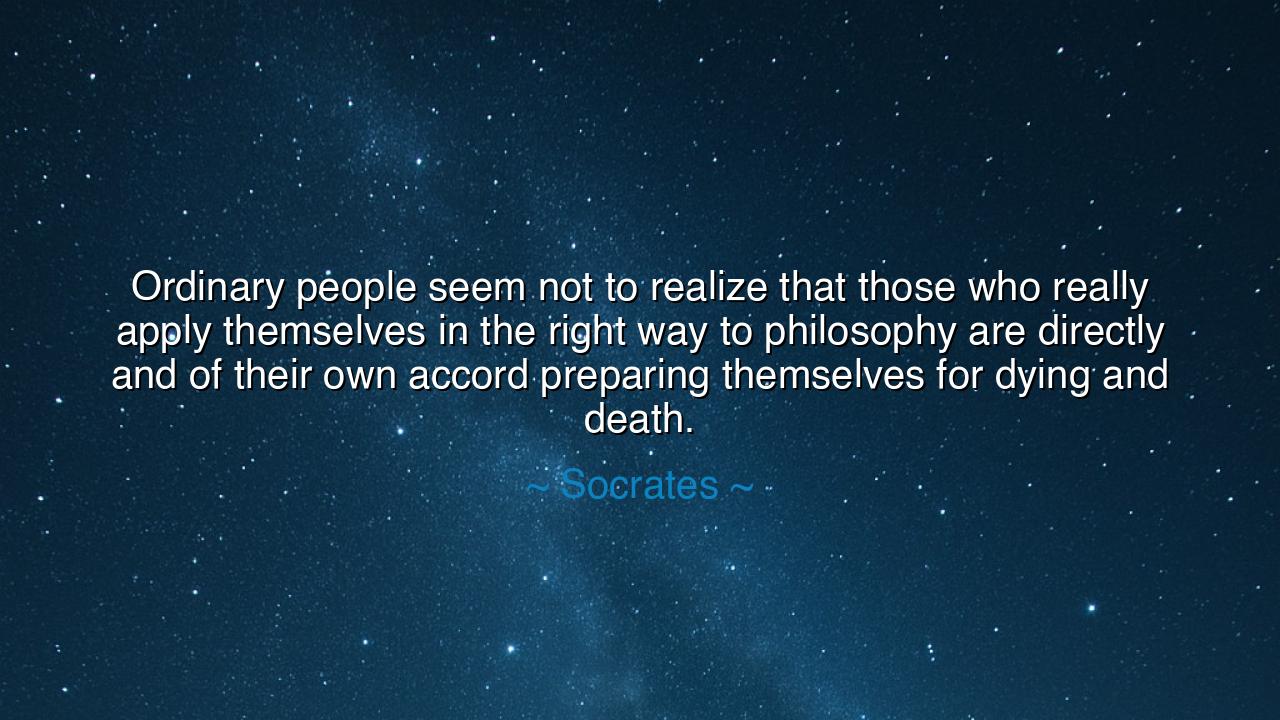
Ordinary people seem not to realize that those who really apply
Ordinary people seem not to realize that those who really apply themselves in the right way to philosophy are directly and of their own accord preparing themselves for dying and death.






"Ordinary people seem not to realize that those who really apply themselves in the right way to philosophy are directly and of their own accord preparing themselves for dying and death." — so spoke Socrates, the immortal voice of wisdom who drank the cup of hemlock with serenity and left behind a legacy that defied the grave. In this profound declaration, uttered in his final hours as recorded in Plato’s Phaedo, he revealed the sacred purpose of philosophy — not merely to think, but to prepare the soul for death. For to live wisely, he taught, is to live in constant remembrance of mortality, and to die wisely is to do so unafraid, knowing that death is not the end, but a release into truth.
The meaning of this quote shines like a beacon across the centuries. To Socrates, philosophy was not an idle pursuit of abstract ideas, but a discipline of the soul, a lifelong cleansing of the mind from illusion. The true philosopher learns to distinguish between what is mortal and what is eternal, between the desires of the body and the aspirations of the spirit. In contemplating truth, justice, and virtue, he slowly detaches himself from the chains of worldly attachment. Thus, when death arrives — as it must for all — he welcomes it not as a calamity, but as a homecoming. To study philosophy is, therefore, to practice dying — not in despair, but in peace.
The origin of these words lies in the dialogue between Socrates and his disciples on the day of his death. Surrounded by friends who wept and despaired, the philosopher remained calm. He reminded them that if the soul is immortal, then death is not to be feared, for it is merely the soul’s liberation from the body’s prison. The body, he said, is filled with distractions — hunger, pain, passion, and desire — which cloud the pursuit of truth. But when the soul is freed from flesh, it can finally behold reality as it truly is. This was not mere rhetoric; it was the conviction of a man who had lived and breathed philosophy, who now walked serenely toward his end, confident in the justice of the divine order.
History remembers Socrates not simply as a thinker, but as one who embodied his teaching unto death. When offered the chance to flee his sentence, he refused, saying that to break the laws of Athens, even to save his life, would violate the principles he had taught. He drank the poison calmly, speaking of the soul’s journey beyond. And as the numbness crept upward through his body, he continued to speak of virtue, of truth, of the eternity of the soul. His death was his final lesson — that philosophy, rightly lived, is not the art of escaping life, but the art of facing death without fear.
This wisdom is not confined to ancient Greece; it echoes in every age where men and women have sought to live with purpose. The Buddha, too, taught that life is impermanent and that liberation comes from seeing beyond the illusions of desire and fear. Marcus Aurelius, the Stoic emperor, meditated each dawn on his mortality, reminding himself that death is natural, and that to live well is to die well. Even modern heroes — from soldiers who accept their fate with courage to physicians who face their own mortality with grace — live out the same truth: that those who have contemplated death deeply have learned the secret of living fully.
Socrates’ teaching is not morbid, but liberating. The fear of death is the root of much human misery — the lust for wealth, the hunger for power, the anxiety of loss. But when one accepts that death is woven into the fabric of existence, life becomes lighter, purer, more precious. The philosopher, having faced the inevitable, lives each moment with clarity. He no longer seeks immortality in possessions or fame, but in the immortality of the soul — in truth, in kindness, in wisdom. This is the heart of Socratic philosophy: to live as though one were already beyond the grasp of death, guided by eternal rather than temporal things.
The lesson, then, is clear: do not flee from the thought of death, but make peace with it. Let it be your teacher, not your terror. Reflect daily upon what is lasting and what is not. Love others deeply, but do not cling; strive for excellence, but not for vanity. Seek truth as if each day were your last, and you will find that fear dissolves, replaced by a quiet strength. Prepare not for death by despairing, but by purifying the heart — by freeing yourself from anger, greed, and pride. In doing so, you will find that you are already living as the philosophers did: ready, when the day comes, to let go with serenity.
And so, O seeker of wisdom, heed the words of Socrates, whose calm before death has outlived the empires of men: to think rightly, to live purely, and to die peacefully — this is the path of the philosopher. For death is not the end of the wise, but their awakening. And when the body falls away, the soul, at last unbound, shall rise to meet the eternal, where truth and beauty are one, and where the philosopher’s long journey finds its rest.






AAdministratorAdministrator
Welcome, honored guests. Please leave a comment, we will respond soon